
Cybersecurity vs Devops Salary: Everything You Need to Know
Cybersecurity and DevOps are two of the most sought-after career paths, each playing a critical role in maintaining and enhancing technological infrastructure. While cybersecurity professionals focus on safeguarding networks and data, DevOps engineers bridge the gap between development and operations to ensure efficient product delivery.
For job seekers and industry professionals, understanding the salary trends and career prospects in these fields is essential.
Whether you’re a fresher starting out or a seasoned professional considering a pivot, analyzing cybersecurity vs DevOps salary data can provide clarity on which path might suit your financial and professional aspirations better.
This article explores how salaries compare across experience levels, regions, and roles, focusing on high-demand skills and emerging opportunities like DevSecOps, a hybrid domain blending security and DevOps.

RELATED: Cybersecurity Salary: A Comprehensive Guide
Cybersecurity vs DevOps: What is Cybersecurity?
Cybersecurity is the practice of protecting computer systems, networks, and data from unauthorized access, theft, or damage. Cybersecurity professionals are tasked with safeguarding the confidentiality, integrity, and availability of digital assets, often referred to as the CIA triad.
Typical roles in cybersecurity include Cybersecurity Analyst, Ethical Hacker, and Security Architect. These professionals handle tasks such as:
- Monitoring systems for threats and vulnerabilities.
- Implementing security measures, such as encryption and firewalls.
- Responding to incidents and breaches.
- Educating teams on secure practices.
The demand for cybersecurity roles is driven by the exponential rise in cyberattacks and the increasing sophistication of malicious actors. This has made cybersecurity one of the fastest-growing fields in the IT industry.
What is DevOps?
DevOps, short for Development and Operations, is a software development methodology that emphasizes collaboration between development teams and IT operations. The primary goal of DevOps is to streamline the software development life cycle (SDLC), ensuring faster delivery and higher-quality products.
Key responsibilities of DevOps Engineers include:
- Automating software deployment processes.
- Managing infrastructure for seamless code integration.
- Ensuring scalability and performance of applications in production environments.
Unlike cybersecurity, DevOps often focuses on optimizing workflows and fostering a culture of continuous improvement. Emerging roles like DevSecOps Engineer integrate security practices into DevOps processes, addressing the growing need for secure application development.
Salary Comparison: Cybersecurity vs DevOps Salary: Key Metrics
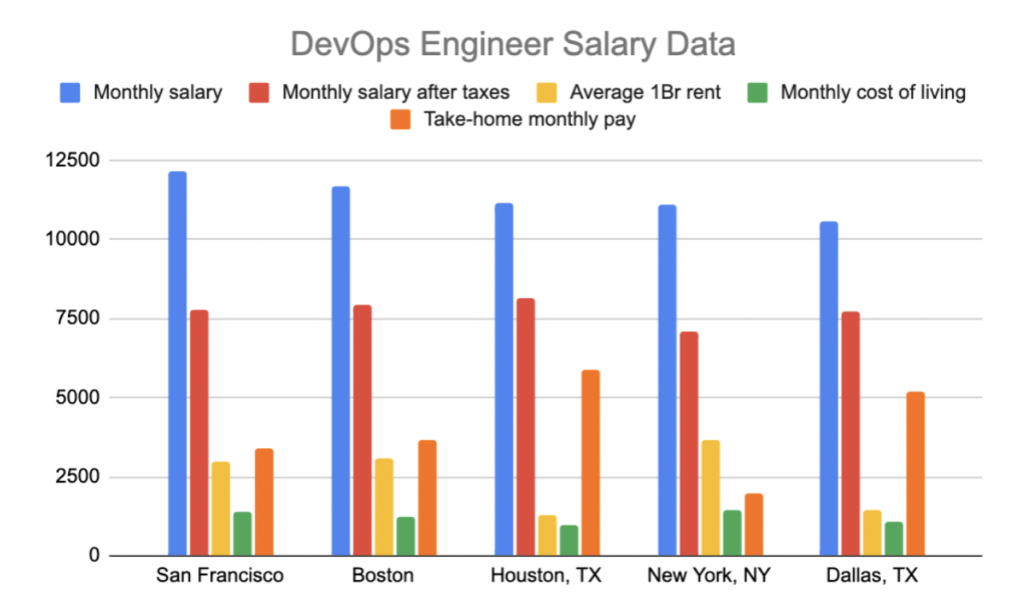
The salary potential in both cybersecurity and DevOps is attractive, but it varies significantly based on factors such as location, experience, and industry. Here’s an overview of how the two fields compare:
- Cybersecurity Salary Overview:
The average annual salary for cybersecurity professionals in the U.S. is approximately $88,422, with a range spanning from $66,000 to $117,000, depending on the role and experience level. High-paying positions include Security Architects and Cybersecurity Managers, which often command salaries near or above the top of the range.
- DevOps Salary Overview:
DevOps professionals typically earn higher average salaries than their cybersecurity counterparts, with an average of $104,019 annually. Salaries for DevOps roles range from $80,000 to $135,000, with cities like San Francisco offering premium compensation packages.
Hourly Wage Comparisons
- Cybersecurity professionals earn an average hourly rate of $42.51, reflecting strong demand for their expertise in incident response and network protection.
- DevOps engineers earn approximately $50.01 per hour, owing to their critical role in deploying and managing scalable applications.
High-Paying Cities and States
Both fields offer lucrative opportunities in specific regions:
- Highest Paying City for Cybersecurity: Los Angeles, CA.
- Highest Paying City for DevOps: San Francisco, CA.
- Highest Paying State for Cybersecurity: Oregon.
- Highest Paying State for DevOps: California.
Industry Insights
- Best Paying Industry for Cybersecurity: Automotive and financial sectors often top the list for competitive salaries due to their need for robust data protection.
- Best Paying Industry for DevOps: Startups and tech firms lead the way, emphasizing the rapid deployment and scalability of applications.
This comparison shows that while both fields are financially rewarding, DevOps professionals tend to earn more on average. However, the unique demands and responsibilities in cybersecurity also make it an appealing choice for those prioritizing job stability and long-term growth.
READ MORE: How to Start a Cybersecurity Firm
Cybersecurity vs DevOps Salary for Freshers
For those just starting their careers, understanding the salary potential for entry-level roles is crucial. Both cybersecurity and DevOps offer strong financial incentives, but the starting salaries can differ based on various factors, such as required skills, certifications, and the job market demand.
Cybersecurity Salary for Freshers
Fresh graduates entering the cybersecurity field can expect an average starting salary of $66,000 to $75,000 annually in the U.S. Entry-level roles, such as Junior Cybersecurity Analyst or IT Security Specialist, typically offer:
- A strong foundation in network security, incident response, and threat detection.
- Opportunities to grow quickly by acquiring certifications like CompTIA Security+, Certified Ethical Hacker (CEH), or CISSP Associate.
High-demand industries, such as finance and healthcare, often provide more competitive starting salaries due to their need for robust data security measures.
DevOps Salary for Freshers
Freshers in DevOps generally earn more than their cybersecurity counterparts, with starting salaries ranging from $75,000 to $85,000 annually. Roles like Junior DevOps Engineer or DevOps Support Specialist involve:
- Working with automation tools like Docker, Kubernetes, and CI/CD pipelines.
- Collaborating with development teams to streamline workflows and reduce deployment time.
The need for skilled automation and infrastructure management professionals makes DevOps an attractive field for beginners looking to secure high-paying positions.
Key Factors Influencing Freshers’ Salaries
- Skill Proficiency: Cybersecurity freshers with hands-on experience in tools like SIEM systems or skills in ethical hacking may negotiate higher salaries. Similarly, DevOps freshers proficient in Python scripting, cloud platforms, or version control systems like Git often start on the higher end of the salary spectrum.
- Certifications: Credentials such as AWS Certified DevOps Engineer for DevOps and Certified Information Systems Security Professional (CISSP) for cybersecurity significantly boost earning potential.
- Regional Demand: Cities with high demand for tech talent, such as Seattle and New York, offer fresher salaries that outpace national averages in both fields.
While DevOps salary for freshers tends to be higher on average, cybersecurity offers unparalleled stability and room for rapid career advancement, making it an equally compelling choice for new entrants.
Cybersecurity vs DevOps Salary in the U.S.
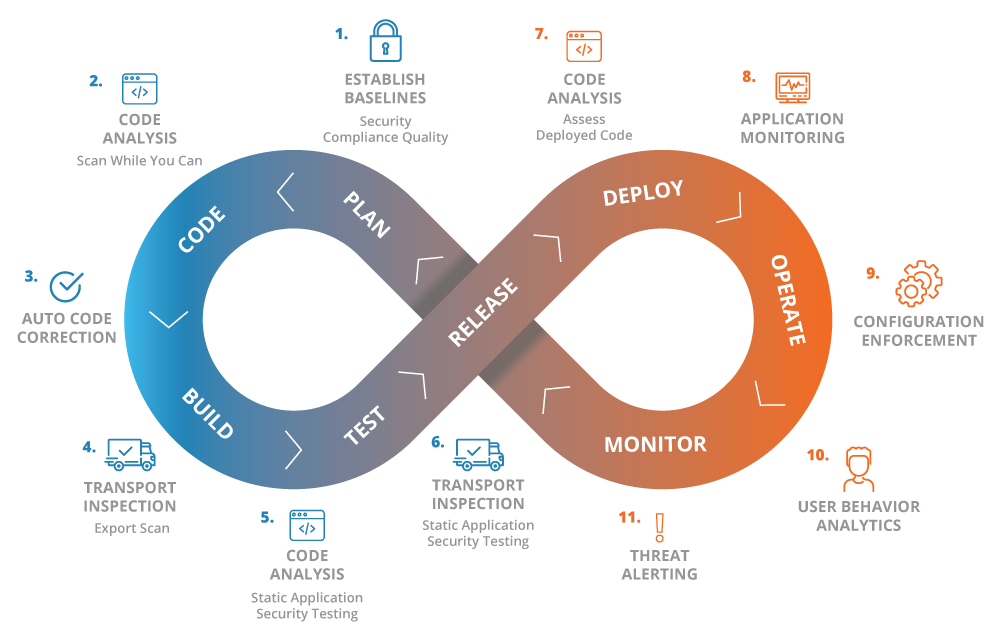
The U.S. continues to be a global leader in offering competitive salaries for both cybersecurity and DevOps professionals. However, the salary dynamics vary widely based on factors like region, industry, and the cost of living. Let’s delve into how these two fields compare across the country.
Cybersecurity vs DevOps Salary Trends Across the U.S.
- Cybersecurity Salaries:
The average annual salary for cybersecurity professionals in the U.S. is $88,422, with a range from $66,000 to $117,000. Roles like Security Architect and Cybersecurity Manager in high-demand industries like finance and healthcare can exceed this range, often touching six figures.
- DevOps Salaries:
DevOps professionals outpace cybersecurity salaries, with an average of $104,019 annually. Entry-level positions start at $80,000, while senior roles in thriving tech hubs can command salaries as high as $135,000.
Regional Salary Comparisons
Both cybersecurity and DevOps professionals see significant salary variations across states and cities:
- High-Paying States for Cybersecurity:
- Oregon: Known for its growing tech sector, cybersecurity salaries here reach the higher end of the spectrum.
- California: A hub for tech giants, offering competitive salaries, especially in cities like San Francisco and San Jose.
- High-Paying States for DevOps:
- California: Leading the way with cities like San Francisco offering average salaries of $120,000 or more.
- Washington: Home to major tech companies, providing lucrative opportunities for DevOps engineers.
Top Cities for Cybersecurity and DevOps Jobs
- Cybersecurity:
- Los Angeles, CA: Offers some of the highest-paying roles in cybersecurity, driven by demand in the entertainment and financial sectors.
- New York, NY: A financial hub requiring extensive cybersecurity measures, making it a lucrative market.
- DevOps:
- San Francisco, CA: The top-paying city for DevOps professionals, with salaries often exceeding $130,000 for senior roles.
- Austin, TX: A growing tech hub offering competitive salaries with a lower cost of living compared to California.
Salary Disparities Between Industries
- Cybersecurity:
- Industries such as automotive, healthcare, and finance lead in cybersecurity salaries, with the need for safeguarding sensitive data driving demand.
- DevOps:
- Startups and cloud-based enterprises offer the best salaries for DevOps engineers, emphasizing scalability and rapid deployment.
The U.S. job market clearly showcases that while DevOps professionals tend to earn higher salaries overall, cybersecurity roles provide more stable opportunities in a wider range of industries.
Factors Affecting Salaries
The salaries for both cybersecurity and DevOps professionals are influenced by several key factors. These variables not only determine earning potential but also shape the growth trajectory for individuals in each field.
Factors Specific to Cybersecurity Salaries
- Skill Demand and Specialization:
- Professionals with expertise in tools like SIEM (Security Information and Event Management), penetration testing, and incident response are in high demand.
- Specialized roles, such as Ethical Hackers and Security Architects, command higher salaries due to the niche skill sets required.
- Certifications:
- Certifications like CISSP (Certified Information Systems Security Professional), CISM (Certified Information Security Manager), and CEH (Certified Ethical Hacker) can boost earning potential by up to 20%.
- Experience Level:
- Entry-level professionals earn between $66,000 and $75,000, while senior cybersecurity roles exceed $117,000 annually.
- Leadership roles in cybersecurity, such as Chief Information Security Officer (CISO), offer six-figure salaries.
- Industry-Specific Needs:
- Industries with stringent compliance requirements, such as finance and healthcare, offer higher salaries to mitigate risks and meet regulations like HIPAA and PCI DSS.
Factors Specific to DevOps Salaries
- Technical Expertise:
- Skills in automation tools like Docker, Kubernetes, and Terraform significantly impact salary levels.
- Proficiency in scripting languages (e.g., Python, Bash) and cloud platforms (e.g., AWS, Azure) is highly valued.
- Certifications:
- Certifications like AWS Certified DevOps Engineer, Google Professional DevOps Engineer, and Docker Certified Associate help professionals secure top-tier salaries.
- Role Complexity and Experience:
- Freshers can earn between $75,000 and $85,000, while senior engineers earn over $135,000 in cities like San Francisco.
- Roles involving CI/CD pipeline management and infrastructure as code (IaC) tend to pay more.
- Industry Focus:
- Tech startups and cloud-based enterprises offer the highest salaries for DevOps roles due to their reliance on agile development and scalable solutions.
Common Factors for Both Fields
- Regional Differences:
- Locations like California, New York, and Texas offer higher salaries due to demand and cost of living.
- Remote work options are also expanding, leveling the playing field for professionals outside major tech hubs.
- Hybrid Skills:
- Professionals with expertise in both fields, such as DevSecOps, can command premium salaries by addressing both operational efficiency and security needs.
- Market Trends:
- The rise of cloud computing, AI, and IoT has elevated the demand for both cybersecurity and DevOps, influencing salary trends positively.
SEE ALSO: Can You Learn Cybersecurity on Your Own
Cybersecurity vs DevOps: Growth Rates and Job Opportunities
Both cybersecurity and DevOps are rapidly growing fields, driven by the increasing reliance on technology across industries. However, their growth rates, job opportunities, and future prospects show significant differences.
Growth Rates
- Cybersecurity:
The U.S. Bureau of Labor Statistics (BLS) projects a 32% growth rate for cybersecurity roles over the next decade, significantly faster than the average for all occupations. This growth is fueled by:
- The rise in cyberattacks.
- Increasing adoption of cloud services.
- Stringent regulatory requirements for data protection.
- DevOps:
DevOps roles are growing at a 21% rate, driven by the adoption of automation and continuous delivery models. While slightly lower than cybersecurity, this growth reflects the increasing demand for scalable, high-performance systems.
Job Opportunities
- Cybersecurity:
- Cybersecurity offers a wide array of roles, including Incident Response Analyst, Security Engineer, and Ethical Hacker.
- Industries like finance, healthcare, and government are key employers, focusing on protecting sensitive data and complying with regulations like HIPAA, GDPR, and PCI DSS.
- Approximately 64,387 cybersecurity job openings are available annually in the U.S., with demand expected to increase as threats evolve.
- DevOps:
- DevOps roles include Infrastructure Engineer, Release Manager, and Cloud Automation Specialist.
- The majority of opportunities are concentrated in tech startups, software development firms, and cloud-based enterprises.
- With 257,025 job openings annually, the DevOps field provides abundant opportunities for professionals skilled in CI/CD, containerization, and cloud computing.
Emerging Roles and Hybrid Opportunities
- DevSecOps:
A hybrid role combining security and operations, DevSecOps Engineers are increasingly sought after by organizations prioritizing secure application development. This emerging field bridges the gap between the two domains, offering unique opportunities for professionals with skills in both cybersecurity and DevOps.
- Cross-Skilling Potential:
Professionals in one field can transition to the other with relative ease by acquiring relevant certifications and skills. For example:
- Cybersecurity experts can move into DevOps by learning automation tools like Docker and Kubernetes.
- DevOps engineers can pivot to cybersecurity by gaining expertise in incident response and threat management.
DevOps or Cybersecurity: Which Pays Better?
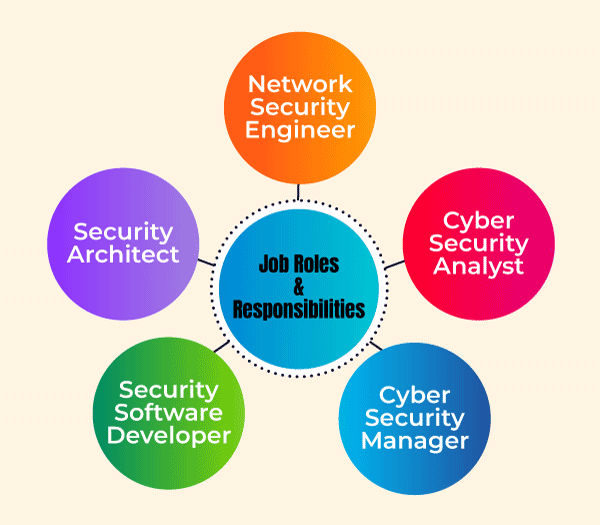
When comparing DevOps vs cybersecurity salaries, the financial prospects in both fields are appealing. However, differences emerge when considering experience levels, industries, and the unique demands of each role.
Salary Potential by Experience Level
- Entry-Level Roles:
- Cybersecurity freshers typically earn $66,000 to $75,000 annually.
- DevOps freshers command slightly higher salaries, ranging from $75,000 to $85,000.
- Mid-Level Professionals:
- Cybersecurity professionals with 3–5 years of experience can expect salaries between $85,000 and $100,000, especially in roles like Security Analyst or Network Security Engineer.
- DevOps engineers with similar experience earn $95,000 to $115,000, particularly those skilled in CI/CD pipelines and cloud platforms.
- Senior Roles:
- Cybersecurity managers, architects, and directors often earn over $120,000, with salaries climbing higher in sectors like finance and healthcare.
- Senior DevOps engineers and architects can earn $135,000 or more, especially in tech hubs like San Francisco and Seattle.
High-Paying Industries
- Cybersecurity:
- Industries requiring strict data protection, such as healthcare, finance, and government, often offer the highest salaries for cybersecurity professionals.
- The automotive sector, particularly companies working on autonomous vehicles, is emerging as a lucrative area for cybersecurity experts.
- DevOps:
- Startups, SaaS companies, and cloud-based enterprises lead in offering competitive salaries for DevOps engineers.
- Established tech companies like Google, Amazon, and Microsoft pay top dollar for DevOps roles due to their reliance on scalable infrastructure.
Impact of Specialized Roles
- Cybersecurity Specialists:
- Ethical hackers, penetration testers, and forensic analysts often earn above-average salaries due to their niche skill sets.
- Certifications like CISSP and CEH can increase salaries by 10–20%.
- DevOps Specialists:
- Roles involving containerization, infrastructure as code (IaC), and cloud automation (e.g., Kubernetes Specialists) are among the highest-paid in the DevOps ecosystem.
- Certifications such as AWS Certified DevOps Engineer can significantly boost earning potential.
Regional Differences
- In the U.S., salaries for both fields are highest in tech hubs like San Francisco, Seattle, and New York. However:
- DevOps roles consistently outpay cybersecurity roles in these regions, with an average salary difference of $15,000 to $20,000 annually.
- Cybersecurity salaries remain more stable across industries and locations, offering broader accessibility to high-paying jobs.
Which Field Pays Better?
While DevOps professionals generally earn higher salaries on average, cybersecurity offers unparalleled stability and consistent growth due to the increasing need for robust security measures across all sectors. The choice between the two often depends on individual priorities, such as financial goals, interest in specific roles, and long-term career aspirations.
READ: The Impact of Quantum Computing on Cybersecurity
DevSecOps vs DevOps Salary: A Specialized Focus
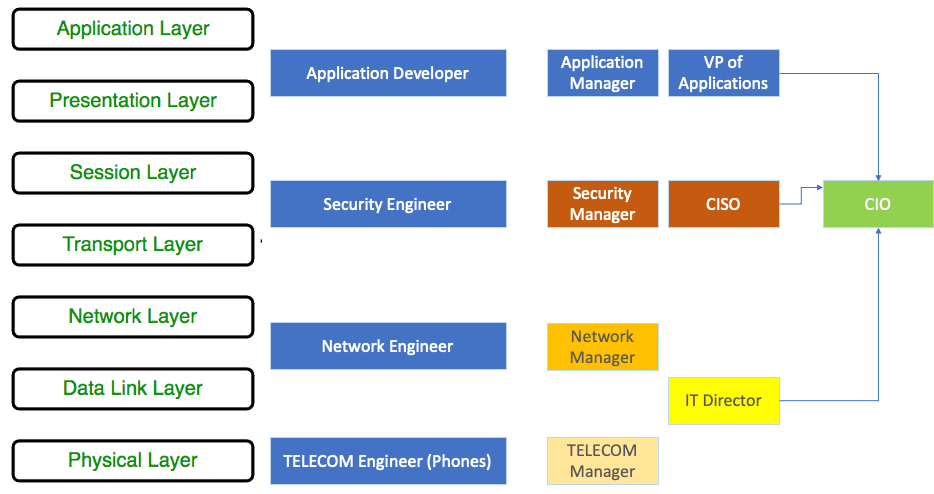
As organizations strive to integrate security into their development workflows, DevSecOps has emerged as a specialized hybrid field. Combining the principles of DevOps and cybersecurity, DevSecOps aims to build secure software without compromising on speed or efficiency. This specialization not only bridges two high-demand fields but also offers lucrative salary prospects.
What is DevSecOps?
DevSecOps (Development, Security, and Operations) ensures that security is incorporated at every stage of the software development life cycle (SDLC). Unlike traditional approaches where security was an afterthought, DevSecOps integrates security from the planning and development stages to deployment and beyond.
Key responsibilities of a DevSecOps Engineer include:
- Automating security checks within CI/CD pipelines.
- Identifying and mitigating vulnerabilities early in the development process.
- Ensuring compliance with security standards like ISO 27001, NIST, and PCI DSS.
DevSecOps vs DevOps Salary
Professionals with expertise in DevSecOps typically earn higher salaries than their DevOps counterparts due to the additional security responsibilities they manage.
- DevOps Salary:
The average annual salary for DevOps engineers in the U.S. is $104,019, with senior roles exceeding $135,000. - DevSecOps Salary:
DevSecOps professionals earn an average of $115,000 to $145,000, depending on experience and industry demand. This premium reflects the dual skill set in security and DevOps tools like Docker, Kubernetes, and Terraform.
Why Does DevSecOps Pay More?
- Hybrid Skill Set:
DevSecOps requires expertise in both DevOps automation and cybersecurity principles, making it a rare and valuable skill set.
- Rising Demand:
As cyberattacks grow in sophistication, organizations prioritize secure software development, increasing demand for DevSecOps roles.
- Complex Responsibilities:
DevSecOps professionals manage high-stakes tasks, such as securing sensitive data during development and ensuring that CI/CD pipelines are compliant with security standards.
Industries Offering High DevSecOps Salaries
- Finance and Healthcare:
Compliance-driven sectors offer premium salaries due to the critical need for secure applications.
- Technology Startups:
Startups prioritize agile, secure development, making DevSecOps engineers indispensable.
Skills That Boost DevSecOps Salaries
- Expertise in security tools like SonarQube and OWASP ZAP.
- Hands-on experience with container orchestration (e.g., Kubernetes) and cloud security.
- Certifications like Certified DevSecOps Professional or AWS Certified Security Specialist.
DevSecOps is not just a role but a methodology that combines the best of both worlds—speed and security. For professionals willing to invest in this hybrid skill set, the financial and career rewards are substantial.
Skill Requirements and Education
The right skills and education are essential for success in both cybersecurity and DevOps, as well as in the emerging hybrid field of DevSecOps. Here, we’ll compare the qualifications and expertise needed for each domain and how they contribute to career and salary growth.
Education Requirements
- Cybersecurity:
- A Bachelor’s degree in Computer Science, Cybersecurity, or Information Technology is the most common educational requirement. Approximately 61% of cybersecurity professionals hold this qualification.
- Advanced degrees, such as a Master’s in Cybersecurity or Information Assurance, can lead to senior roles and higher salaries.
- Relevant coursework includes network security, encryption techniques, and incident response.
- DevOps:
- A Bachelor’s degree in Computer Science, Software Engineering, or a related field is held by 75% of DevOps professionals.
- DevOps roles often emphasize practical skills over formal education, with bootcamps and certifications playing a significant role.
- Key areas of study include automation frameworks, cloud infrastructure, and programming languages like Python and Java.
Key Skills in Cybersecurity
- Technical Expertise:
- Incident response and threat detection.
- Proficiency in tools like SIEM systems (e.g., Splunk, QRadar).
- Knowledge of network security and encryption protocols.
- Certifications:
- CISSP (Certified Information Systems Security Professional).
- CEH (Certified Ethical Hacker).
- CompTIA Security+.
- Soft Skills:
- Analytical thinking to evaluate threats.
- Communication skills for reporting vulnerabilities and training teams.
Key Skills in DevOps
- Automation and Scripting:
- Proficiency in CI/CD tools like Jenkins and GitLab.
- Scripting languages such as Python, Bash, and Ruby.
- Containerization and Orchestration:
- Hands-on experience with Docker, Kubernetes, and Terraform.
- Familiarity with Infrastructure as Code (IaC) practices.
- Cloud Platforms:
- Expertise in AWS, Azure, or Google Cloud.
- Certifications like AWS Certified DevOps Engineer and Google Professional DevOps Engineer.
- Soft Skills:
- Collaborative mindset to work across teams.
- Problem-solving for managing complex systems.
Emerging Skill Set: DevSecOps
- Security-Driven Development:
- Integration of security testing into CI/CD pipelines.
- Proficiency in tools like SonarQube and OWASP ZAP.
- Hybrid Certifications:
- Certified DevSecOps Professional.
- AWS Certified Security – Specialty.
- Understanding Compliance:
- Knowledge of regulatory frameworks such as ISO 27001, PCI DSS, and GDPR.
Role of Certifications in Salary Growth
Certifications are a game-changer for professionals in both fields. They validate skills, enhance credibility, and can lead to salary increases of 10–20%. For example:
- A CISSP-certified cybersecurity professional can earn significantly more than peers without certification.
- Similarly, AWS DevOps Certified Engineers are among the highest-paid in the DevOps domain.
Career Path Considerations
Choosing between a career in cybersecurity, DevOps, or a hybrid path like DevSecOps requires careful consideration of long-term salary growth, job stability, and personal interests. Here’s an in-depth look at the career trajectories and opportunities in each field.
Long-Term Salary Growth
- Cybersecurity:
- Salaries tend to rise steadily with experience and certifications.
- Mid-level professionals (5–10 years) often earn $85,000–$120,000, with leadership roles exceeding $150,000.
- High-demand roles such as Security Architect or Chief Information Security Officer (CISO) can command salaries upwards of $200,000 in top industries like finance and healthcare.
- DevOps:
- DevOps engineers typically see faster salary growth in the first decade of their careers, with senior positions offering $120,000–$150,000 or more.
- Specialized roles in automation, cloud architecture, and containerization can push salaries to $170,000, particularly in startups or tech giants.
- Professionals transitioning into DevSecOps often see significant salary boosts due to their hybrid skill sets.
Opportunities for Lateral and Upward Mobility
- Cybersecurity:
- Vertical growth is common, moving from roles like Cybersecurity Analyst to Security Engineer and eventually to C-suite positions like CISO.
- Lateral transitions into niche roles such as Ethical Hacking, Digital Forensics, or Cloud Security are also viable.
- DevOps:
- Professionals can advance from Junior DevOps Engineer to Senior Engineer, then to roles like DevOps Architect or Infrastructure Lead.
- Lateral mobility into related fields like Cloud Engineering or Site Reliability Engineering (SRE) is common.
- DevSecOps:
- The hybrid nature of DevSecOps opens doors to leadership positions in both development and security, offering unique opportunities for upward mobility.
Job Stability and Industry Demand
- Cybersecurity:
- Job stability in cybersecurity is unmatched, given the increasing frequency and sophistication of cyberattacks.
- Industries like healthcare, finance, and government ensure consistent demand for skilled professionals, irrespective of economic conditions.
- DevOps:
- The demand for DevOps engineers is strongest in tech-driven industries like software development, SaaS, and cloud-based enterprises.
- However, reliance on automation tools may lead to fluctuating demand for entry-level positions over time.
- DevSecOps:
- As a growing field, DevSecOps provides a blend of stability and innovation, making it an ideal choice for those seeking dynamic career paths with strong security.
Hybrid Roles and Cross-Skilling
- Cybersecurity and DevOps professionals can explore hybrid roles like DevSecOps to expand their career horizons.
- For example:
- Cybersecurity experts can transition into DevOps by gaining skills in CI/CD pipelines and containerization.
- DevOps engineers can pivot to cybersecurity by mastering incident response and compliance standards.
Which Path Is Right for You?
The choice between cybersecurity and DevOps depends on individual priorities:
- Choose Cybersecurity If:
- You value job stability and are passionate about protecting sensitive data and systems.
- You prefer a career with steady growth and leadership opportunities.
- Choose DevOps If:
- You thrive in fast-paced environments and enjoy automation and optimization tasks.
- You aim for higher initial salaries and rapid advancement in tech-focused industries.
- Consider DevSecOps If:
- You want the best of both worlds, integrating security and development expertise.
- You’re interested in leadership roles that require a broad understanding of secure, scalable systems.
This analysis highlights that both fields offer promising career paths, with hybrid opportunities like DevSecOps providing a unique middle ground for professionals looking to excel in today’s dynamic IT landscape.
Cyber Security vs DevOps: Which Career Should You Choose?
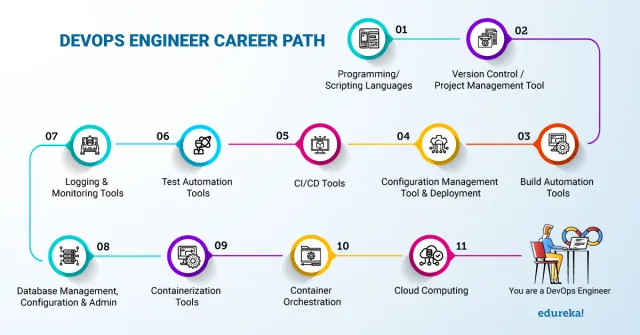
Choosing between cybersecurity and DevOps can be a daunting decision, as both fields offer lucrative salaries, exciting challenges, and promising growth prospects. The right choice depends on your personal interests, career goals, and the type of work environment you thrive in. Let’s break down the key factors to help you make an informed decision.
Key Considerations
- Interest in the Work:
- Cybersecurity: If you are passionate about protecting systems, preventing breaches, and mitigating risks, cybersecurity is an excellent fit. Roles here often involve problem-solving, vigilance, and incident response.
- DevOps: DevOps appeals to those who enjoy automating workflows, optimizing software development, and working collaboratively across teams. It’s perfect for individuals who thrive in dynamic, fast-paced environments.
- Financial Goals:
- DevOps Salary Advantage: DevOps professionals generally start with higher salaries than cybersecurity roles, with averages of $104,019 compared to $88,422 for cybersecurity.
- Cybersecurity Stability: While starting salaries may be lower, cybersecurity roles offer steadier salary growth, particularly in compliance-heavy industries like finance and healthcare.
- Demand and Job Security:
- Cybersecurity: The rapid increase in cyber threats has created an insatiable demand for cybersecurity professionals, making this field more recession-proof.
- DevOps: DevOps roles are also in high demand, particularly in tech-driven companies, but their reliance on specific tools and methodologies may result in fluctuating opportunities over time.
Cybersecurity vs DevOps: Work-Life Balance
- Cybersecurity:
- Work-life balance can vary depending on the role. For instance, incident response and threat monitoring may require after-hours availability.
- However, many roles, especially in governance or compliance, offer predictable schedules.
- DevOps:
- DevOps roles often involve managing CI/CD pipelines and deployments, which can lead to irregular hours, especially during software releases or production issues.
- Organizations with mature DevOps processes may offer better work-life balance.
Opportunities for Growth
- Cybersecurity:
- Professionals can advance to roles like Security Engineer, Ethical Hacker, or CISO.
- Certifications like CISSP and CEH provide a pathway to leadership and specialization.
- DevOps:
- Growth paths include becoming a DevOps Architect, Cloud Engineer, or Site Reliability Engineer (SRE).
- Certifications like AWS Certified DevOps Engineer and Kubernetes Specialist are essential for advancement.
- Hybrid Opportunities:
- Roles in DevSecOps allow professionals to integrate security and development expertise, commanding premium salaries and opening doors to leadership positions.
Recommendations Based on Your Goals
- Choose Cybersecurity If:
- You prioritize job stability, compliance-driven industries, and the opportunity to protect critical systems.
- You have an analytical mindset and enjoy investigating and mitigating risks.
- Choose DevOps If:
- You’re drawn to fast-paced environments focused on automation, cloud infrastructure, and innovation.
- You prefer collaborative roles that directly impact software delivery speed and quality.
- Consider DevSecOps If:
- You want a hybrid role that combines the best of both fields.
- You are skilled in both automation tools and security frameworks, enabling you to lead secure, efficient software development processes.
Conclusion
The decision between a career in cybersecurity or DevOps boils down to individual preferences, career aspirations, and the type of work environment you thrive in. Both fields offer lucrative salaries, immense growth opportunities, and the chance to work on critical aspects of modern technology infrastructure.
- Cybersecurity stands out for its stability and the opportunity to protect sensitive systems and data. With a projected growth rate of 32%, it is a solid choice for those who value job security and are passionate about combating cyber threats.
- DevOps, on the other hand, is ideal for professionals who enjoy automation, collaboration, and optimizing software development processes. With higher starting salaries averaging $104,019, it’s a great option for those looking for rapid financial growth in dynamic environments.
- DevSecOps bridges the two fields, offering hybrid roles that integrate security into every stage of the software development life cycle. For those who wish to blend their skills and maximize career flexibility, DevSecOps provides the best of both worlds.
The choice between cybersecurity vs DevOps depends on your interests and long-term goals. Whether you’re drawn to the challenge of preventing cyberattacks or the excitement of streamlining development workflows, both paths promise rewarding careers.
Explore certifications, training programs, and emerging trends in your chosen field. For those still undecided, consider hybrid roles like DevSecOps that combine the strengths of both domains. Your journey to a fulfilling and high-paying career starts with the right decision today!
FAQ
Which is better, cyber security or DevOps?
The answer depends on your interests and career goals:
Cybersecurity is better for those passionate about protecting systems, data, and networks from threats. It offers strong job stability, particularly in industries like finance and healthcare, and is ideal for those who enjoy analytical and problem-solving tasks.
DevOps is better for individuals who enjoy automation, collaboration, and optimizing workflows. It tends to offer higher starting salaries and faster career growth in tech-focused environments.
If you’re interested in blending these fields, DevSecOps provides a hybrid path combining development and security expertise.
Which pays more, cyber security or software engineer?
Software Engineers typically earn higher starting salaries, averaging $110,000–$130,000 annually, especially in roles involving specialized skills like AI, machine learning, or cloud development.
Cybersecurity Professionals earn average salaries of $88,422, with top roles like Security Architect and CISO exceeding $150,000–$200,000.
While software engineers may earn more on average, cybersecurity offers unparalleled job stability and consistent demand due to the growing importance of data protection.
Is DevOps a high-paying job?
DevOps is one of the highest-paying roles in the IT industry. The average annual salary for a DevOps engineer in the U.S. is $104,019, with experienced professionals earning over $135,000. Specialized skills in cloud platforms, containerization, and CI/CD pipelines can push salaries even higher, particularly in tech hubs like San Francisco and Seattle.
Who earns more, web developer or cyber security?
Web Developers earn an average salary of $69,000–$93,000, with senior roles reaching $120,000–$130,000.
Cybersecurity Professionals earn an average of $88,422, with leadership roles exceeding $150,000.
While web developers have higher entry-level opportunities, cybersecurity professionals tend to earn more in the long term, especially in high-demand industries like finance, healthcare, and government.
Transform your career with ExcelMindCyber’s roadmap to six-figure success in cybersecurity. Our program delivers essential guidance and strategies to help you master the skills and secure the roles that matter. Start today and take the first step towards transforming your career!
